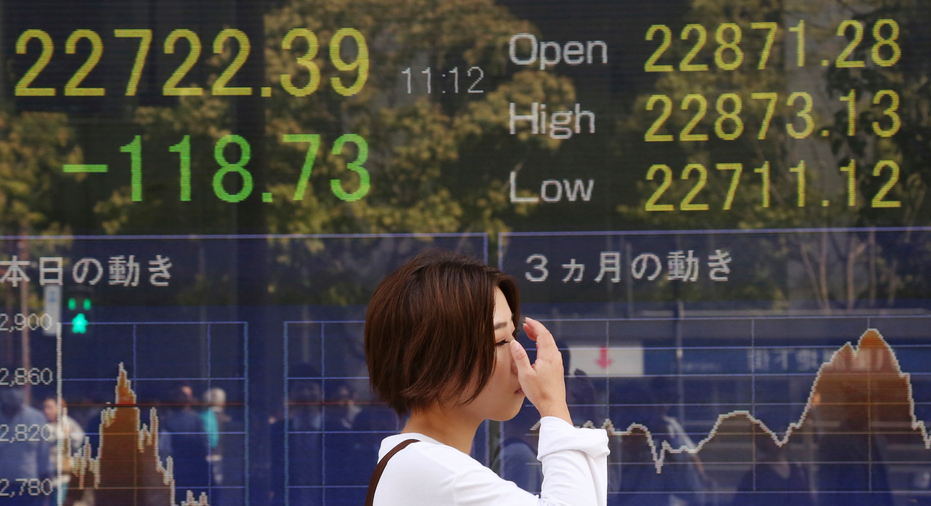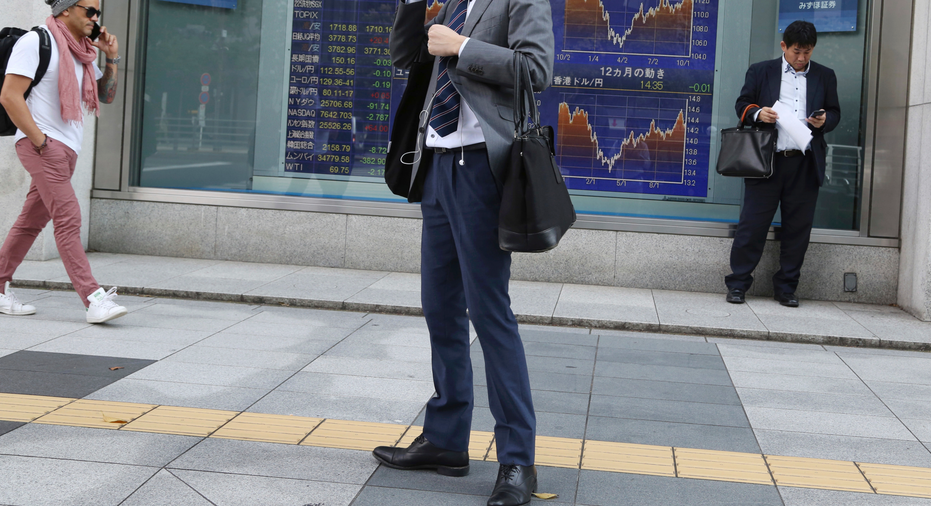World shares mixed after Wall St retreat, weaker Japan data
A woman walks by an electronic stock board of a securities firm in Tokyo, Thursday, Oct. 18, 2018. Shares fell Thursday in Asia after a retreat on Wall Street driven by a sell-off of technology shares, homebuilders and retailers. A report of weaker Japanese exports in September underscored uncertainties over the outlook for trade. (AP Photo/Koji Sasahara)
BANGKOK – Shares turned higher in Europe on Thursday after declines in Asia and on Wall Street. A report of weaker Japanese exports in September underscored uncertainties over the outlook for trade.
KEEPING SCORE: Germany's DAX added 0.4 percent to 11,757.54 and the CAC 40 in France gained 0.2 percent to 5,154.37. Britain's FTSE 100 added 0.2 percent to 7,065.67. The future contract for the Dow Jones industrial average fell 0.2 percent to 25,677.00 and that for the S&P 500 lost 0.4 percent to 2,805.80.
CHINA'S CURRENCY FALLS: China's politically sensitive yuan fell to a 22-month low against the dollar after the U.S. Treasury declined to label Beijing a currency manipulator. The yuan fell to 6.9411 per dollar, the closest it has come to breaking the symbolic level of seven to the greenback since December 2016, but recovered slightly in the afternoon.
JAPAN TRADE: Japan recorded a trade surplus for September of 139.6 billion yen ($1.2 billion), but exports fell 1.2 percent from the previous year in the first decline for the world's third largest economy since 2016. A series of natural disasters took a toll, but the lag in exports also reflects uncertainties over trade tensions after President Donald Trump imposed penalty tariffs on billions of dollars' worth of Chinese exports.
ANALYST'S VIEWPOINT: "Net exports probably remained a drag on GDP growth in the third quarter. It now looks likely that economic activity came to a standstill in Q3," Marcel Thieliant of Capital Economics said in commentary. He added that the nearly 5 percent drop in export volumes shows that external demand has weakened.
FED TALK: The Federal Reserve's minutes from its meeting in late September, when it raised interest rates for the third time this year showed some participants thought the Fed's key interest rate would eventually need to "become modestly restrictive" to ensure inflation doesn't climb too high. Other officials felt the Fed shouldn't take that step unless there are signs the economy is overheating and inflation is rising quickly.
ASIA'S DAY: Japan's Nikkei 225 index sank 0.8 percent to 22,658.16 and the Kospi in South Korea lost 0.9 percent to 2,148.31. Hong Kong's Hang Seng index was almost unchanged at 25,454.55 and the Shanghai Composite index tumbled 2.9 percent to 2,486.42. Australia's S&P ASX 200 reversed losses to gain 0.1 percent, ending at 5,942.40. Shares fell in Southeast Asia and Taiwan.
WALL STREET: U.S. shares ended with moderate losses on Wednesday after an early slide. A Commerce Department report on falling new home starts hit homebuilders and retailers. Technology stocks fell after IBM reported its biggest loss in five and a half years. It sank 7.6 percent. The S&P 500 index fell 0.71 points to 2,809.21. The Dow Jones Industrial Average slumped 0.4 percent to 25,706.68. The Nasdaq composite slid 2.79 points to 7,642.70. The Russell 2000 index of smaller-company stocks skidded 0.5 percent to 1,589.60.
ENERGY: The price of U.S. crude oil lost 63 cents to $69.12 per barrel in electronic trading on the New York Mercantile Exchange. Brent crude, the international standard, lost 78 cents to $79.27 per barrel.
CURRENCIES: The dollar fell to 112.52 yen from 112.66 yen. The euro fell to $1.1519 from $1.1578.





















